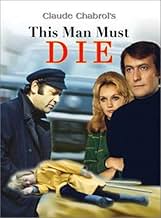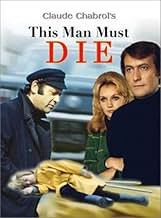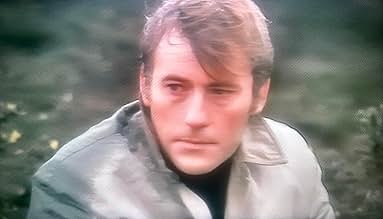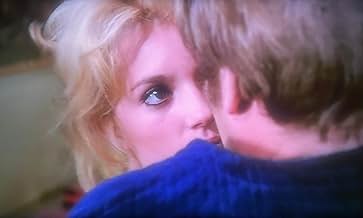IMDb-BEWERTUNG
7,6/10
5146
IHRE BEWERTUNG
Ein Mann behauptet sich im Leben einer Schauspielerin, von der er glaubt, dass sie irgendwie für den Tod seines Sohnes verantwortlich ist.Ein Mann behauptet sich im Leben einer Schauspielerin, von der er glaubt, dass sie irgendwie für den Tod seines Sohnes verantwortlich ist.Ein Mann behauptet sich im Leben einer Schauspielerin, von der er glaubt, dass sie irgendwie für den Tod seines Sohnes verantwortlich ist.
- Regie
- Drehbuch
- Hauptbesetzung
- Auszeichnungen
- 1 wins total
Empfohlene Bewertungen
This is a very fine psychologic thriller in some mellow tones. The story is simple : a boy gets killed by a mad car driver and his father wants to find the man to kill him. We know, from the start, that there can be two finale : the father kills the man, or he changes his mind. But Chabrol makes us think that it can have another finale... Or another? Or perhaps this one? Not at all! We never thought of the real finale. This is brillant, well written and directed movie. Very fine acting by Duchaussoy and Yanne.
"Que la bête meure " belongs to Chabrol's golden era.This is one of his most brilliant achievements,and,nevertheless,he would do even better with the next one"le boucher",with,again,Jean Yanne,an actor,who,before ,was featured in generally mediocre commercial movies.In his two films with Chabrol ,Yanne will show skills we would never thought of.Both characters,in "que la bete..." and "le boucher" are monsters;but monsters of different kinds:in "le boucher",Yanne is pitiful,moving,a product of the war (in Algeria?)On the other hand,in "Que la bête...",he's a hateful vulgar petit bourgeois brute.Compare the way Chabrol introduces his characters:in "le boucher",Popaul appears in the first scene,the wedding banquet,and he seems a good guy.In "Que la bête...",Chabrol does not show his face during Duchaussoy's son death on the road.When finally,the father discovers the reckless driver's house,we meet first his scared family circle.Then we hear his formidable voice.All happens like in a fairy tale:Tom Thumb entering the ogre's den.Perhaps Chabrol's most terrifying character, he holds up to ridicule his wife's attempt at poetry and he cannot understand his son ,a frail,sensitive,and clever teenager. The plot will take shape quickly,and after this story of sound and fury,the last pictures brings the audience some relief.Note,in both films,"le boucher" and "Que la bête.." ,the presence of water in these last pictures.
Claude Chabrol made a lot of films during his career, and while I've only really scratched the surface so far - I have to say that this one is right up there with his very best! Chabrol's films aren't thrillers in the same vein as those made by the likes of Alfred Hitchcock (in spite of the fact that he is often known as 'The French Hitchcock'); with Chabrol the thrills don't come from moments of suspense or tension, but from the interest generated in the lead characters and the situation put forward, and that was never truer than with this film - perhaps the most sombre revenge movie ever made! The film starts off with a young boy returning home from the beach. However, his stroll is interrupted when a car comes out of nowhere and runs him down. The boy's father, a man named Charles Thenier, is distraught following the accident and vows to track down the man who did it. His thirst for revenge is great, but his hatred towards the murderer is so immense that he decides, one he finds him, to befriend and lure him into a false sense of security before killing him...
Since there's not a great deal of excitement in the visceral sense, it may seem on the surface that This Man Must Die does not do its job as a thriller. However, this couldn't be further from the truth. Chabrol's film is brooding and intriguing throughout and has a great sense of realism in the way that the wronged father goes after the man who killed his son. It has to be said that the film somewhat hinges on coincidence, but this is actually addressed within the film itself and the events that take place are largely logical. Once again, Chabrol's production values are high and the film is incredibly beautiful and it bodes well with the sober tone of the movie. The acting is fantastic, with Michel Duchaussoy doing well in the lead role and receiving excellent feedback from the lovely Caroline Cellier and the brilliant Jean Yanne who steals every scene he's in as the villain of the piece. The film boils down to an excellent conclusion that both comes as something of a surprise and adds some Greek tragedy into the mix. Overall, this is another big success for the great French director and comes highly recommended!
Since there's not a great deal of excitement in the visceral sense, it may seem on the surface that This Man Must Die does not do its job as a thriller. However, this couldn't be further from the truth. Chabrol's film is brooding and intriguing throughout and has a great sense of realism in the way that the wronged father goes after the man who killed his son. It has to be said that the film somewhat hinges on coincidence, but this is actually addressed within the film itself and the events that take place are largely logical. Once again, Chabrol's production values are high and the film is incredibly beautiful and it bodes well with the sober tone of the movie. The acting is fantastic, with Michel Duchaussoy doing well in the lead role and receiving excellent feedback from the lovely Caroline Cellier and the brilliant Jean Yanne who steals every scene he's in as the villain of the piece. The film boils down to an excellent conclusion that both comes as something of a surprise and adds some Greek tragedy into the mix. Overall, this is another big success for the great French director and comes highly recommended!
This is one of the best Chabrol films I have seen. It's interesting to note that it's based upon a novel by Nicolas Blake, pen name of C. Day Lewis, at one time Poet Laureate of England and father of Daniel Day Lewis. From the movie, it seems Blake/Lewis was writing very much in the spirit of the great, and very cinematic, mistress of psychological crime writing, Patricia Highsmith. Though she never wrote anything exactly like this, the similarity is in the first-person narrative of a potential murderer, and in the way the story approaches an utterly evil person in an everyday upper-bourgeois setting; even the account of a man having an 'affair' with a woman he isn't necessarily attracted to is typically Highsmith; and there's attempted murder on a sailboat, and a man is almost bludgeoned on the head with a rock Highsmith devices. The journal of the man contemplating murder, which is then found out, is something Highsmith might have liked.
Though as some have noted the narrator finds his way to the hit and run killer of his son a little too easily, the movie by allowing that is able to take us headlong into an astonishing, almost shocking situation. To get so close to evil -- this man who everybody hates, who would kill and cover it up and make his sister collaborate, who is abusive to everybody and everything, yet lives in bourgeois splendor, is so unusual it takes a while to realize how hair-raising it is.
Events move quickly after that. This is more understated than most of Chabrol and the greatest violence consists of a few slaps on the face of a lover or a boy, and words of abuse hurled by a boorish man and his nasty mother, but those moments are all the more disturbing for coming in such a buttoned-up world, and the action is very fast and economical compared to some of Chabrol's films. The scenes between the narrator and the boy Philippe where the boy says he wants his father dead and wishes Mark/Charles were his father, are very touching. The references to the rich variety of death descriptions in the Iliad are particularly resonant, as is the one at the end to Brahms quoting Hebrew scriptures, with the Brahms song sung by the great Kathleen Ferrier. The style may be neutral but the film is elegant and its look has not dated. The repugnant family scenes and the nightmarish dinners are typically Chabrol. The simplicity of the style is the more impressive seen in terms of possible followers like Ozon. They don't make them like this any more; they can't.
Michel Duchaussoy makes a good contrast to Yanne because he is so bland. He's an intentionally neutral figure whose moral status is meant to be ambiguous. Is he a hero out of Greek tragedy or is he just an escaping villain? Has he brought about justice -- has he even done it, since the son claims responsibility -- or has he merely been sucked into a whirlpool of evil? In the detective's office he finally begins to look for the first time like a sensitive writer. Before that he looked like a bland actor, but his opacity is just what Chabrol wants. Maybe he's one of Chabrol's most appealing heroes, but in the end what are we admiring?
Though as some have noted the narrator finds his way to the hit and run killer of his son a little too easily, the movie by allowing that is able to take us headlong into an astonishing, almost shocking situation. To get so close to evil -- this man who everybody hates, who would kill and cover it up and make his sister collaborate, who is abusive to everybody and everything, yet lives in bourgeois splendor, is so unusual it takes a while to realize how hair-raising it is.
Events move quickly after that. This is more understated than most of Chabrol and the greatest violence consists of a few slaps on the face of a lover or a boy, and words of abuse hurled by a boorish man and his nasty mother, but those moments are all the more disturbing for coming in such a buttoned-up world, and the action is very fast and economical compared to some of Chabrol's films. The scenes between the narrator and the boy Philippe where the boy says he wants his father dead and wishes Mark/Charles were his father, are very touching. The references to the rich variety of death descriptions in the Iliad are particularly resonant, as is the one at the end to Brahms quoting Hebrew scriptures, with the Brahms song sung by the great Kathleen Ferrier. The style may be neutral but the film is elegant and its look has not dated. The repugnant family scenes and the nightmarish dinners are typically Chabrol. The simplicity of the style is the more impressive seen in terms of possible followers like Ozon. They don't make them like this any more; they can't.
Michel Duchaussoy makes a good contrast to Yanne because he is so bland. He's an intentionally neutral figure whose moral status is meant to be ambiguous. Is he a hero out of Greek tragedy or is he just an escaping villain? Has he brought about justice -- has he even done it, since the son claims responsibility -- or has he merely been sucked into a whirlpool of evil? In the detective's office he finally begins to look for the first time like a sensitive writer. Before that he looked like a bland actor, but his opacity is just what Chabrol wants. Maybe he's one of Chabrol's most appealing heroes, but in the end what are we admiring?
In taking a slight cue from Alfred Hitchcock (one of Chabrol's heroes), but going another step further, This Man Must Die follows a logical turn of events for a single father who's son is run over in a hit and run by some cruel man in a fast car. In Hitchcock's hands this might be led by elegant stars, have even moments of scathing wit. But Chabrol's vision is a little darker, more that is seething under this surface, with the bourgeois as much of the commonplace as just the backdrop for the theater of revenge about to take place. But like the old master, Chabrol takes a twist with the material: as the father, Charles Thenier, going by an alias as a writer of children's books, gets more than acquainted with a woman who is the sister-in-law of the killer, gets to know the family more, and gets to know slimy, shrewd businessman and big-time garage owner Paul Decourt more, he's not really the only one out for his head.
As Chabrol goes further, it becomes a tale of Greek tragedy, or some variation on it. Paul's son, Philippe (a character as played by jean Yanne as if almost out of Bresson), hates his father with a passion, as his father has no respect for or tries to encourage his son with what he's got going on at school (perhaps conventionally, every scene with the father and son is a tense and violent outburst from father towards innocent son). One might think a collaboration might happen between the secretive, diary-writing Charles and the kind but frustrated kid, but this too isn't that simple. Chabrol also takes a smart tactic with that diary of Charles's; it could be just a narrative gimmick, and at times it feels as just that (maybe one of the film's only drawbacks, if only only on), but it does start to probe into a mindset that is one-track, and not without some reason in the genre sense. We're pitted on Charles's side, as he sneaks his way into Helen's heart, and then through her sometimes nice and other times (i.e. Paul's mother) savage in their verbal brutality.
But this same diary works as a something of a step-up from a psychological MacGuffin. Chabrol twists around with plot into motivation, and he pulls it off with his shooting and editing style, which applies just small, precise touches of the good old French New Wave into the proceedings (the occasional jump-cut, as any filmmaker knows, can't hurt under the right circumstances). What Chabrol's brilliant achievement is to transcend the trappings of a revenge film and to explore what the nature of malevolence brings past a simple crime- certainly these bastards have families, if they have the capacity to clear up their crimes with such skill like an owner of a hugely profitable auto-body/garage- and at the same time put a human angle into a plot that requires it. The actors do what they can (the man playing Charles, who I have not seen in other films, is very good in the lead, as is in his own right the man playing Paul Decourt, adding some layers to this rotten being), and despite some clunky scenes that do have to deal with the plot, there's some wit thrown in under the surface ("It's not a needle in a haystack, more like a needle in a box of needles,").
If This Man Must Die isn't a great film, and I'm not sure it is, it is at least a very successful example of finding some of the cracks in a revenge mystery, of adding that superlative mix of character into plot, and seeing what makes things like a diary, or a slip off a cliff, or an ambiguous ending, tick.
As Chabrol goes further, it becomes a tale of Greek tragedy, or some variation on it. Paul's son, Philippe (a character as played by jean Yanne as if almost out of Bresson), hates his father with a passion, as his father has no respect for or tries to encourage his son with what he's got going on at school (perhaps conventionally, every scene with the father and son is a tense and violent outburst from father towards innocent son). One might think a collaboration might happen between the secretive, diary-writing Charles and the kind but frustrated kid, but this too isn't that simple. Chabrol also takes a smart tactic with that diary of Charles's; it could be just a narrative gimmick, and at times it feels as just that (maybe one of the film's only drawbacks, if only only on), but it does start to probe into a mindset that is one-track, and not without some reason in the genre sense. We're pitted on Charles's side, as he sneaks his way into Helen's heart, and then through her sometimes nice and other times (i.e. Paul's mother) savage in their verbal brutality.
But this same diary works as a something of a step-up from a psychological MacGuffin. Chabrol twists around with plot into motivation, and he pulls it off with his shooting and editing style, which applies just small, precise touches of the good old French New Wave into the proceedings (the occasional jump-cut, as any filmmaker knows, can't hurt under the right circumstances). What Chabrol's brilliant achievement is to transcend the trappings of a revenge film and to explore what the nature of malevolence brings past a simple crime- certainly these bastards have families, if they have the capacity to clear up their crimes with such skill like an owner of a hugely profitable auto-body/garage- and at the same time put a human angle into a plot that requires it. The actors do what they can (the man playing Charles, who I have not seen in other films, is very good in the lead, as is in his own right the man playing Paul Decourt, adding some layers to this rotten being), and despite some clunky scenes that do have to deal with the plot, there's some wit thrown in under the surface ("It's not a needle in a haystack, more like a needle in a box of needles,").
If This Man Must Die isn't a great film, and I'm not sure it is, it is at least a very successful example of finding some of the cracks in a revenge mystery, of adding that superlative mix of character into plot, and seeing what makes things like a diary, or a slip off a cliff, or an ambiguous ending, tick.
Wusstest du schon
- WissenswertesThis film is based on a British novel of the 1930s written by the poet C. Day Lewis (under the pseudonym "Nicholas Blake") and is one of several novels by him to feature as its hero the brilliant amateur sleuth Nigel Strangeways. This adaptation, in addition to moving the action to modern-day France, entirely leaves out this leading character (or any new French character equivalent to him).
- PatzerAt the beginning Paul is shifting several times although the Mustang has an automatic transmission.
- VerbindungenFeatured in Das Kino bittet zu Tisch (2005)
- Soundtracks4 ernste Gesänge Op. 121
Music by Johannes Brahms (as Brahms)
Performed by Kathleen Ferrier (as Katleen Ferrier)
Disque DECCA ACL 306
Top-Auswahl
Melde dich zum Bewerten an und greife auf die Watchlist für personalisierte Empfehlungen zu.
- How long is This Man Must Die?Powered by Alexa
Details
- Laufzeit
- 1 Std. 50 Min.(110 min)
- Sound-Mix
- Seitenverhältnis
- 1.66 : 1
Zu dieser Seite beitragen
Bearbeitung vorschlagen oder fehlenden Inhalt hinzufügen





























